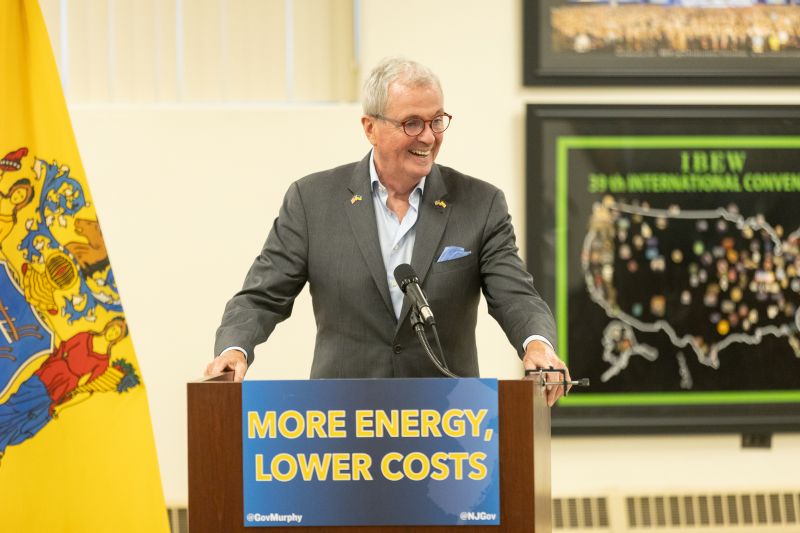Gov. Phil Murphy on Aug. 22 joined legislative sponsors, local leaders, union members and advocates in Lawrenceville to sign bills to expand the state’s community solar program and to use incentives to vastly accelerate the construction of energy storage facilities across the state. — Courtesy: Governor’s Office
By Joshua Burd
New Jersey’s pioneering community solar program is poised for a massive expansion under a bill signed into law Friday by Gov. Phil Murphy.
The measure, S4530/A5768, authorizes another 3,000 megawatts of capacity under a framework that has brought rooftop solar panels to warehouses across New Jersey while bringing clean energy to thousands of New Jersey households. That would roughly quadruple the capacity that has been built or earmarked to date by the state Board of Public Utilities since it effectively launched the program in late 2023, bringing solar energy to another 450,000 New Jersey residents, including 250,000 low-income families.
Murphy signed the bill alongside another measure, A5267/S4289, which calls for using incentives to vastly accelerate the construction of energy storage facilities across the state.
“Today, we are taking immediate and far-reaching steps to lower energy costs for every household in New Jersey,” Murphy said. “By accelerating the process for bringing new sources of energy online and rapidly building new energy storage facilities, we will meet growing demand while also making life more affordable for our state’s families. As part of this process, we are going to create good-paying, union jobs and build a cleaner, more resilient future for every New Jerseyan.”

According to the governor’s office, S4530 directs the BPU to open registration by Oct. 1, 2025, for the additional 3,000 megawatts of community solar projects. That’s likely to spark participation by warehouse owners throughout New Jersey that, under the existing program, can lease their rooftops to solar developers.
Solar companies then sell that energy directly to the grid, rather than those inside the building, with at least 51 percent of the power going to low- and moderate-income residents. That’s paved the way for solar capacity in the state to increase from 2.4 to 5.2 gigawatts since Murphy took office in 2018, officials said, with solar currently powering the equivalent of more than 600,000 homes.
“I want to thank Governor Murphy for his leadership in advancing clean power solutions for New Jersey,” BPU President Christine Guhl-Sadovy said. “This legislation addresses real problems. More New Jerseyans will get access to the benefits of expanded community solar programs — one of the best ways for residents to lower their utility bills while contributing to clean energy in the Garden State. And large-scale battery storage will strengthen our electric grid and keep the lights on when we need it most. This is how we build a grid that works for everyone.”
Murphy signed the bills last week during a ceremony at the IBEW Local 269 office in Lawrenceville, standing alongside legislative sponsors, local leaders, union members and advocates. He did so as officials reiterated their criticism of regional grid operator PJM, alleging mismanagement in connection with the energy cost crisis.
The prime sponsors of S4530/A5768 are Sens. Vin Gopal and John McKeon and Luanne Peterpaul, Marge Donlon and Robert Karabinchak of the state Assembly. The prime sponsors of A5267/S4289 are Sens. Bob Smith and John Burzichelli and Assemblymen Wayne DeAngelo, Dave Bailey Jr. and Kevin Egan.
“Community solar has delivered real benefits for working families across New Jersey, but our current limits on project development are holding back its full potential,” Gopal said. “This bill modernizes the program to meet today’s needs, cutting red tape, creating savings and accelerating our clean energy transition. At a time of rising electricity costs, we should be making it easier, not harder, to build local solar projects that lower bills and reduce strain on our grid. This is an opportunity to deliver immediate value to consumers while helping New Jersey meet its clean energy goals. With smart policy and strong investment, community solar can help power our future, affordably and equitably.”
Smith, chair of the Senate Energy Committee, added: “As projected energy demand and electricity costs rise, it is more important than ever to invest in innovative technology that will both enhance the stability of our grid and enable cost savings for New Jersey residents. By incentivizing and procuring the creation of transmission-scale energy storage we will enable a wider application of clean energy that can charge and store energy at low-cost hours then discharge at high-cost, high-demand hours, thus lowering overall costs and smoothing demand spikes on the grid. This legislation will help keep New Jersey at the forefront of investments in new, clean energy technology, even as the current federal administration seeks to sabotage our environment and our renewable future.”









